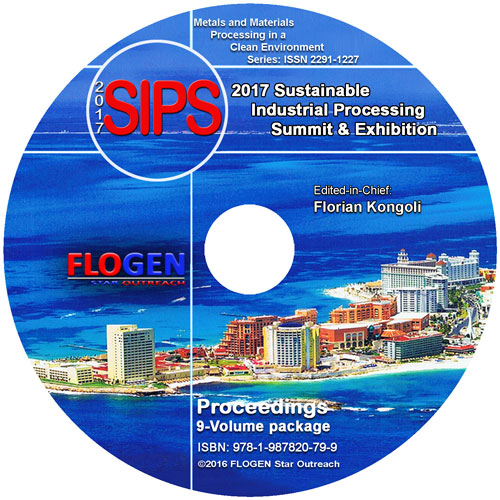2017-Sustainable Industrial Processing Summit
SIPS 2017 Volume 4. Lotter Intl. Symp. / Mineral Processing
| Editors: | Kongoli F, Bradshaw D, Waters K, Starkey J, Silva AC |
| Publisher: | Flogen Star OUTREACH |
| Publication date: | 19 December 2017 |
| Pages: | 226 pages |
| ISBN: | 978-1-987820-67-6 |
| ISSN: | 2291-1227 (Metals and Materials Processing in a Clean Environment Series) |

CD shopping page
Industrial Impact Development for OptimOre, a Collaborative EU Project on Sustainable Supply of Raw Materials (Tungsten and Tantalum)
Yousef Ghorbani1;1CAMBORNE SCHOOL OF MINES - UNIVERSITY OF EXETER, Exeter, Great Britain;
Type of Paper: Regular
Id Paper: 179
Topic: 5
Abstract:
The modern economy is highly dependent on specific raw materials, and it is envisaged that this dependency will increase in the near future. Most of them are scarce in the European Union (EU) and of poor purity, being mixed with complex and low-grade aggregates which need to be processed by means of a separation process consuming high quantities of energy and water, and even in some cases, this makes its exploitation unfeasible due to production costs. Being EU dependent on some of these materials, as identified by the European Innovation Partnership (EIP) initiative, our society is demanding more efficient extracting processes to contribute to major European independency on these Critical Raw Materials (CRMs). Tungsten and Tantalum ores are two recognized CRMs: In a market currently dominated by China and Russia production (among others), in Europe Tungsten (limited) production is mostly concentrated in UK, Spain and Portugal. On the other side, Tantalum is a key element on electronics with clear EU external production dependency, as it is naturally really scarce in Europe (only 1% of world production is concentrated in EU). Knowing this situation, OptimOre Project as a first EU project on raw materials has started a comprehensive research and development of modeling and control technologies in order to study the secure sustainable supply of raw materials (Tungsten and Tantalum) to the European economy whilst increasing benefits for society as a whole. The approach to do this was based on, using advanced sensing and industrial control, artificial intelligence techniques, aiming to increase yield in 7-12% on the current best production processes and increasing energy saving on a 5% compared to the best available techniques. This work consists of 8 partners in 4 different countries and 7 advisory board from industry.
In this paper will present industrial impact development approach in OptimOre project introducing a general techno-economic impact of this project. The number of the successful non-disclosure agreement (NDA) with different relevant companies in Europe have been discussed.